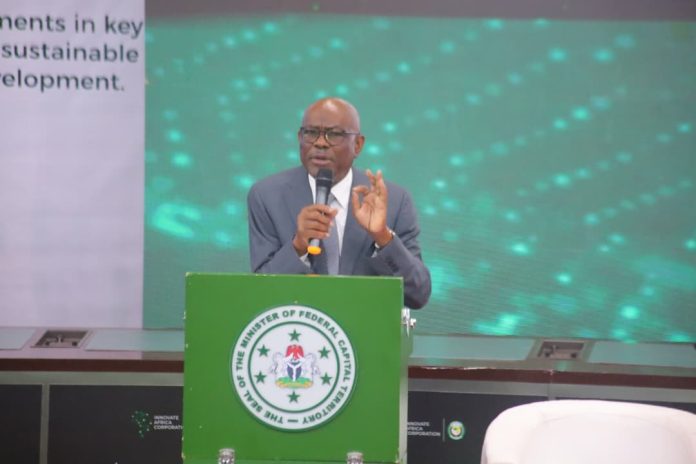… calls for shift to transformational governance
By Sarah NEGEDU
The Minister of the Federal Capital Territory, Nyesom Wike, has criticised what he described as the prevailing culture of transactional leadership across Africa, warning that the trend has kept the continent trapped in poverty despite its vast human and natural resources.
Wike made the remarks in Abuja while delivering a keynote address titled “Reimagining Africa’s Leadership and Investment” at the 2025 Innovate Africa Conference held at the ECOWAS Secretariat.
He said Africa’s leadership trajectory, whether in military or civilian rule, has for decades been shaped by patronage politics and personal ambition rather than national development priorities.
“Africa today stands at a historic crossroads. On one hand, we are blessed with immense natural wealth, youthful energy, and creative potential; yet we continue to grapple with weak institutions, infrastructural decay, poverty, and unemployment. This is the paradox of our age. How can a continent so richly endowed remain so constrained?” he asked.
The minister, who received the Innovate Africa Leadership Award 2025, said leadership remains the determining factor in whether abundance produces prosperity or stagnation.
“When leadership is visionary, accountable, and courageous, even the most daunting obstacles can be transformed into opportunities,” he said.
Wike, therefore called for a deliberate shift from transactional leadership driven by patronage and short-term gains, to transformational governance that promotes service, accountability, and courage.
He said, “The time has come to move beyond transactional leadership to embrace transformational governance that empowers rather than exploits, serves rather than rules, and builds rather than blames.”
The minister lamented that Africa’s post-independence experience has been marked by leaders unprepared for the scale of national challenges before them. “Consequently, we keep experimenting with the fundamentals of development basic infrastructure, healthcare, credible institutions, and functional economies. The result has been decades of missed opportunities,” he said.
The FCT Minister urged African leaders to rediscover the ethos of servant-leadership anchored on empathy and humility. “Africa needs servant-leaders, not bosses who command, but mentors who inspire. Leadership is not about power or position; it is about trust, service, and shared purpose,” he said.
Citing developments in Abuja, Wike said visionary leadership and political will can translate aspirations into measurable outcomes. “In Abuja, we have seen how infrastructural renewal, anchored on commitment and accountability, can redefine a city’s identity. Roads once impassable now connect communities, and abandoned spaces now thrive with enterprise,” he said.
He commended President Bola Ahmed Tinubu’s “courageous and reform-driven leadership,” especially the removal of fuel subsidy and ongoing institutional reforms saying, “Tinubu demonstrated uncommon courage by confronting Nigeria’s toughest challenge, subsidy removal, a decision that is already yielding dividends in increased revenue for development and economic stability,” he said.
On Africa’s economic independence, Wike maintained that the continent must end its dependency on foreign aid. “Development cannot be donated; it must be built. Aid has become a crutch that weakens our resolve. The time has come for Africa to take ownership of its destiny,” he said.
He identified the African Continental Free Trade Area, AfCFTA, as a central instrument for the continent’s economic rebirth. “The AfCFTA is not just a trade agreement; it is a declaration that Africa will no longer be a supplier of raw materials and a dumping ground for finished goods,” he said.
Wike concluded with a call for urgency and conviction in leadership across the continent. “Africa’s future will not be given to us; we must build it. History will not remember what we merely dreamed for Africa, but what we did for Africa. The time is now, the place is here, and the responsibility is ours. The future belongs to Africa,” he said.



